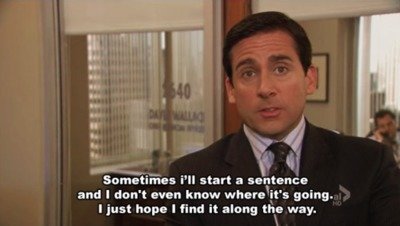Interviewing With an Accelerator
A Few Dos and Don’ts
This post has been altered from its original version on April 18th, 2017. It has been formatted to work with your startup.
So you’ve applied to an accelerator. Maybe StartupYard, maybe Y-Combinator, or maybe somewhere not quite as famous…. What do you need to do to prepare for the interview?
The answers might surprise you. This is not a job interview, and it isn’t a meeting with a typical investor. Preparing for an accelerator interview is unlike preparing for any other interview you’ve had.
Based on dozens of rounds of interviews with 7 batches of startups, here are our tips on how to (and how not to) prepare for your big moment:
Different accelerators have different requirements in their interview process. Find out what the selection committee needs to know about you, and come prepared.
If the interview instructions say: “no slides” (as ours do), then please, for your sake, don’t come into the interview planning to give a presentation. Accelerators like StartupYard typically will provide very clear instructions on what kind of information you should prepare. Prepare that information, and if you can, memorize it.
You can probably guess what the first 3-5 questions of your interview will be about. I’ll give you a hint: What problem you’re solving, what you’ve done so far, your business model, your long-term vision, and your team’s unique qualifications.
Other accelerators may pepper you with buzzwordy questions like: “What is your unfair advantage?” or “what are you disrupting?” We find that approach to be a bit silly, but nevertheless, preparing to answer it will force you to think strategically about how you present yourself. 
The worst thing that can happen in a startup interview, in our experience, is a founder simply not understanding these basic questions, or why they matter. Consider hard questions that can be asked, and be ready with answers.
The above is not to say that you can prepare all of your answers in advance. You can’t.
While the first few questions will probably be easier and more predictable, you have to quickly shift to listening, and honing in on the questions that the evaluators will ask. These questions will increase in complexity as the interview continues. So keep this in mind: answer the exact question that is being asked.
Depending on culture, direct questions can make people nervous. They seem too definitive, or too aggressive. Or they feel like a trap. Some people fear that if they say “yes,” or “no,” that they will be picking the wrong side.
Sometimes startup founders will go further and try, as a politician would, to answer the question not being asked. If I asked you whether you’d make money from advertising or not, you might say: “we are open to many approaches and business models, and haven’t ruled anything out.” That’s not a wrong answer, but it also isn’t a good one.
Even if you aren’t sure, a better answer is something like: “Yes, that’s a possibility for these following reasons…” or “no, we doubt that would work for the following reasons…”
To keep yourself from straying too far from a question, consider opening each answer with a definitive statement first. Yes, no, or “I don’t know.” Then go on to explain that answer. This will help you to get your point accross, and more importantly, gain the trust of the interviewers, who will, believe me, take note of whether you really answer a question or not.
Oh boy. This is probably the most common major failure in a startup interview. Not knowing as much about your competitors as the panel does is a quick trip to the bottom of a list of startups for an accelerator.
And talking about your competition is also tricky. Too commonly, founders think they can answer these questions by dismissing them: “they aren’t really in the same business as us,” or “their UX is no good.” These handwaving answers don’t confront what the question is really getting at, which is about how you see your own company, and how you will actually deal with competitors.
Remember, that you can both differentiate yourself with competitors, and use competitors to your advantage. A strong competitor can be an asset to you, because it helps to prove that your business is filling a real need. How you then differentiate from them, without ignoring them, is essential for us to understand your ambitions and plans.
If you don’t have competition, then you don’t have a market. First-mover advantage is simply not that attractive unless you are miles ahead of potential competitors in terms of your technical capabilities. If your pitch relies on the idea that your competitors don’t know something, then this is not a good argument for your sustained success.
Many startups confuse their unique value proposition with their market: they think that because nobody does things the way they do, that means they don’t have any real competitors.
There should be questions from the evaluators that you don’t have the answers to. That’s fine. You can admit that you don’t know something, particularly if it is a question about something over which you have little control. You can control how much you know about your competition, and you have control over what kind of a team you are building, and what you’re all doing with your time.
The things you don’t know are important to acknowledge. They will consume a lot of your time, and refusing to face them in the interview, to an accelerator, indicates that you’re certainly not ready to tackle them head on.
You should be able to make educated guesses, and make it clear that they are guesses, but when you really don’t have a way of knowing the answer to a specific question, the evaluators will respect the fact that you don’t know yet. In fact, they may ask you questions with the intention of gauging how connected with reality you really are. Saying that you know something, when you have no way of knowing, will not create confidence, it will lose you our trust.
The StartupYard mentor page is publicly accessible. So are those of most other accelerators. Read it, and get to know our team and our mentors. Some of them will be your evaluators (though we won’t tell you in advance who they will be). Understanding what we know, what our experience is, and what kinds of teams we have accelerated in the past, will give you a natural advantage when talking to us about your future at StartupYard.
On the other hand, not knowing who we are, and showing that you really don’t understand what we do, is a big red flag to us about how seriously you take the opportunity. Know what you’re getting into first.
Remember who you’re talking to. You may be used to convincing people that your product is a good idea, but we’re also interested in whether your business is a good idea.
Interviews go wrong when founders can’t switch from talking about how exciting their product is, to talking about their plans to build a global business out of it. The two are not the same. You can have amazing technology, and an impressive product helps a lot, but don’t give the impression that you believe that an amazing product will mean that success is a certainty.
Amazing products fail all the time. Just ask Apple, which failed more often than it succeeded for around 20 years. The strength of the company in the future will depend on your ability to assess competition, think creatively, and build a solid team. If you can do that, you can succeed. Maybe you aren’t an Apple. Maybe you’re a Microsoft: a company with a long list of products no one loves, but everyone uses anyway. Microsoft didn’t build its business on people loving its products, it built itself upon people needing them.

This last one may seem a bit cheesy, but honestly, it might be the most important advice you get from this post. Smile!
I could go into the psuedo-scientific talk about how smiling produces happy hormones, or alters your mood and the mood of those around you, but just try it out sometime. Smile at people. You don’t have to go around grinning like an idiot, but smiling, and being energetic engaging helps people to like you. It helps people to empathize with you and take you seriously.
Know what doesn’t help others to take you seriously? Taking yourself too seriously. Projecting confidence doesn’t mean having a poker face. When people meet you, particularly in a formal situation like an interview, they are assessing not only your IQ, but also your EQ: your emotional range and abilities. This is easily just as important to us when looking at startups, as the question of whether or not they’re smart, or accomplished in life.
So smile: you’re a startup founder. We’ll see you at the interview.

 StartupYard Announces “Prague Hacks,” the City’s Biggest Ever Open Data...
StartupYard Announces “Prague Hacks,” the City’s Biggest Ever Open Data...